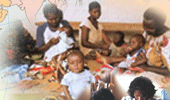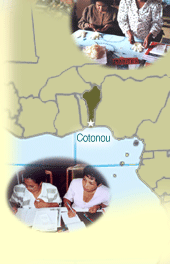
Applying National Protocols
PRIME II assisted the Ministry of Health in field-testing revised national family health protocols in the regions of Borgou/Alibori, Atlantique/Littoral and Mono/Couffo. To minimize disruption of services, providers were trained in the protocols mostly at their facilities through a blend of traditional classroom training, tutoring and self-directed learning. Development of the protocols began in 1999, with PRIME offering extensive input on content and a user-friendly presentation of the material. Organized in three volumes covering women, common reproductive health services, and men, youth and children, the protocols are designed to assist providers at each level of Benin’s service delivery system, from communal health centers and sub-district clinics to tertiary hospitals.
Key Results: Providers in all three regions significantly improved their knowledge test scores in STIs, safe motherhood, child health and infection prevention. For example, scores in knowledge of STIs improved from 45% pre-training to 86% post-training and 81% at six months follow-up for providers in Borgou/Alibori (n=27) and from 49% pre-training to 83% post-training and 78% at follow-up for providers in the other two regions (n=23).
Establishing Clear Performance Expectations
Health care providers often do not clearly understand what is expected of them in a way that is prioritized and personalized. From mid-2003 to mid-2004, PRIME II developed and tested a set of interventions designed to improve the clear performance expectations (CPE) of nurse-midwives. Nurse-midwives in four districts received CPE interventions while nurse-midwives in three others served as a control group. All providers received standard orientation and training in the revised national family health protocols, but in the CPE group four priority services were identified from the protocols: prenatal care with an emphasis on counseling and identification of risk factors, FP counseling including counseling for HIV/AIDS/STIs, normal delivery with a focus on use of the partograph, and newborn care including resuscitation. The CPE group developed individual action plans for the priority services, agreed with mentors on desired performance, and adapted the action plans based on facility-specific situation analyses conducted with tutors. Community leaders added local perspectives to the action plans, helped mobilize modest resources to address facility deficiencies, and supported health education sessions. Mentoring, job aids, peer support and supportive supervision were employed to support the CPE interventions.
Key Results: Percent improvement on a composite set of indicators representing the priority services was significantly higher in the CPE group, 21% vs. 11.5%. The cost of the interventions was about 17% higher for the CPE group, which, when compared with the improvement in provider scores, suggests that CPE is more cost-effective. Focus group discussions provided information that will be useful for fine-tuning the CPE approach.
Strengthening Emergency Obstetric and
Neonatal Care
In Benin, a woman’s lifetime risk of dying from complications of childbirth is one in 12, and almost a quarter of deliveries occur in the home. To reduce high rates of maternal and neonatal mortality, the MOH developed a national plan of action for emergency obstetric and neonatal care (EONC) in 1999. In collaboration with the MOH and the USAID bilateral PROSAF project, PRIME II conducted a performance needs assessment (PNA) in late 2000 in the area selected for pilot EONC interventions, Malanville/Karimama health zone in the Borgou/Alibori region. The PNA identified numerous obstacles to service delivery including unqualified personnel, logistical problems and lack of community awareness. Interventions selected in response included reinforcing managerial capacity for EONC services in the health zone, improving provider performance at maternity centers, developing the capacity of community health workers and family members to recognize and respond to danger signs in pregnancy and delivery, and establishing community partnerships to respond to emergencies.
Key Results: The pilot project trained 54 providers in EONC, 24 based at the zonal hospital and the rest in primary facilities. At the time of the PNA, 0% of health aides and only 33% of nurses and midwives had sufficient knowledge to offer EONC services, and no standards of care existed to support these providers. By the final evaluation in 2004, all of the nurse-midwives at the zonal hospital were able to correctly identify at least 14 out of 16 complications outlined in case studies, and 89% of health aides (n=9) sampled were able to recognize danger signs of pregnancy and postpartum care. Over 90% of community-based health agents (n=24) could describe complications requiring referral, and the evaluators observed active emergency savings funds and transportation plans in all 11 villages in the pilot zone, with 114 recorded cases of transported referrals.
Preventing Postpartum Hemorrhage
As part of USAID’s special initiative to reduce postpartum hemorrhage in four African countries, PRIME II trained more than 120 skilled birth attendants to practice active management of the third stage of labor (AMTSL) for vaginal births at seven pilot sites in Benin. The MOH contributed equipment and supplies to upgrade the providers’ facilities and PRIME worked to improve supervision and incorporate AMTSL into national service standards and protocols. Before the intervention skilled attendants were not performing AMTSL at all in Benin.
Key Results: AMTSL for vaginal births at the pilot sites increased from 0% in April 2003 when the interventions began to 76% (4,687/6,187 births) at final evaluation in February 2004. Proportion of postpartum hemorrhage cases for vaginal deliveries decreased significantly, from 6.2% to 2.5%. No complications from AMTSL were reported at any of the intervention sites. Due to positive monitoring results, the Benin Department of Family Health indicated their interest in country-wide scale-up of AMTSL before the final evaluation of the pilot. USAID/Benin is funding expansion of AMTSL through the ACQUIRE project.
Improving Pharmacy Family Planning Services
PRIME II collaborated with Population Services International (PSI) on a strategy to improve the ability of pharmacy agents to offer basic family planning and reproductive health counseling to their clients in Benin s two largest cities, Cotonou and Porto-Novo. The project began under PRIME I in 1998. Using the Performance Improvement approach, PRIME assessed performance needs, developed training materials and prepared 140 pharmacy agents to improve the quality of FP counseling and increase provision of oral contraceptives. Non-training interventions were implemented to create clearer job definitions and develop job aids.
Key Results: An evaluation found prepared agents (n=58) performing significantly better than unprepared agents (n=21) in five areas of care (57% vs. 28% of all tasks carried out satisfactorily).
|











